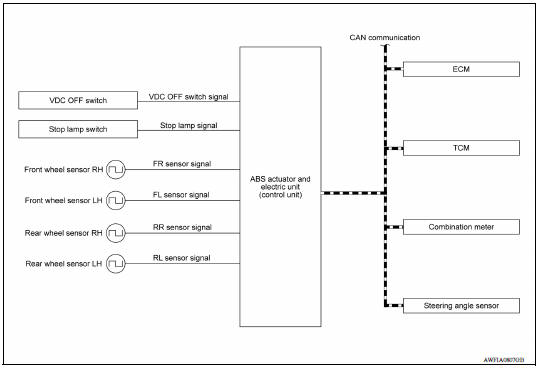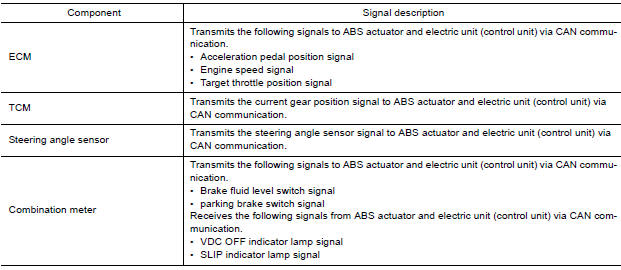 Nissan Versa Sedan Service ManualBrakes » Brake control system (BRC) » VDC/TCS/ABS
Nissan Versa Sedan Service ManualBrakes » Brake control system (BRC) » VDC/TCS/ABS
VDC/TCS/ABS : VDC Function
Nissan Versa
Sedan Service Manual
VDC/TCS/ABS : VDC Function
SYSTEM DIAGRAM

SYSTEM DESCRIPTION
- Side slip or tail slip may occur while driving on a slippery road or
intending an urgent evasive driving maneuver.
VDC function detects side slip status using each sensor when side slip or tail slip is about to occur and improves vehicle stability by brake control and engine output control during driving.
- In addition to ABS function, EBD function and TCS function, target side slip amount is calculated according to steering operation amount from steering angle sensor. By comparing this information with vehicle side slip amount that is calculated from information from yaw rate/side G sensor and wheel sensor, vehicle driving conditions (conditions of understeer or oversteer) are judged and vehicle stability is improved by brake force control on all 4 wheels and engine output control.

- VDC function can be switched to non-operational status (OFF) by operating VDC OFF switch. In this case, VDC OFF indicator lamp turns ON.
- Control unit portion automatically improves driving stability by performing brake force control as well as engine output control, by transmitting drive signal to actuator portion according to difference between target side slip amount and vehicle side slip amount
- Brake force control function at braking hard detects driver′s brake operations with the pressure sensor, judges a brake booster′s maximum brake power function by using information from the vacuum sensor, and enhances more powerful braking force by controlling brakes of four wheels.
- VDC warning lamp blinks while VDC function is in operation and indicates to the driver that the function is in operation.
- CONSULT can be used to diagnose the system.
- Fail-safe function is adopted. When a malfunction occurs in VDC function, the control is suspended for VDC function and TCS function. However, ABS function and EBD function operate normally. Refer to BRC "Fail-safe".
INPUT SIGNAL AND OUTPUT SIGNAL
Major signal transmission between each unit via communication lines is shown in the following table.

OPERATION CHARACTERISTICS
VDC Function That Prevents Oversteer Tendency
- During cornering, brake force (brake fluid pressure) is applied on front wheel and rear wheel on the outer side of turn. Momentum is generated directing the vehicle toward the outer side of the turn. Oversteer is prevented.

- Changing driving lane on a slippery road, when there may be a tendency to oversteer, engine output is controlled as well as brake force (brake fluid pressure) of 4 wheels. Oversteer tendency decreases.

VDC Function That Prevents Understeer Tendency
- During cornering, brake force (brake fluid pressure) is applied on front wheel and rear wheel on the inner side of turn. Momentum is generated directing the vehicle toward the inner side of the turn. Understeer is prevented.

- Applying brakes during cornering on a slippery road, when there may be a tendency to understeer, engine output is controlled as well as brake force (brake fluid pressure) of 4 wheels. Understeer tendency decreases.

More about «VDC/TCS/ABS»:
VDC/TCS/ABS : System Description
VDC/TCS/ABS : VDC Function
VDC/TCS/ABS : TCS Function
VDC/TCS/ABS : ABS Function
VDC/TCS/ABS : EBD Function
VDC/TCS/ABS : Fail-safe
Nissan Versa Sedan Service Manual / Brakes / Brake control system (BRC) / VDC/TCS/ABS / VDC/TCS/ABS : VDC Function
Nissan Versa Sedan Service Manual
Categories
© 2017-2025 Copyright www.niveguide.com
